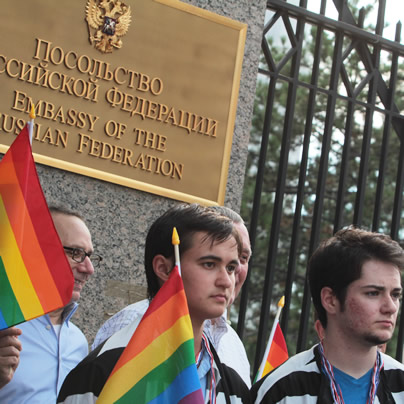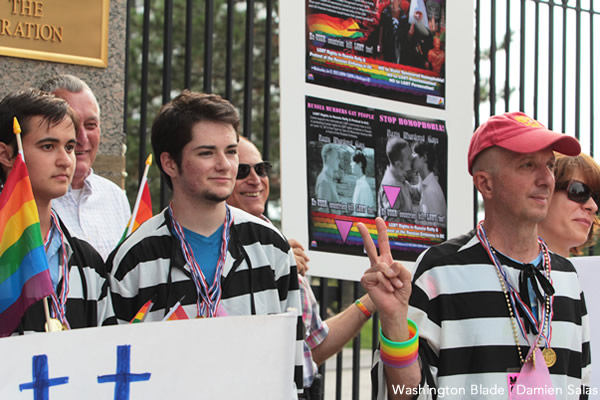News
Russian activist: Gay crackdown seeks to ‘shut down’ advocacy
Polina Andrianova’s group fined 500,000 rubles under “foreign agent” law


Protesters gathered outside of the Russian Embassy on Wednesday, July 31, 2013. (Washington Blade photo by Damien Salas)
“These laws are aimed at driving LGBT people back into silence, back underground, back to the invisibility,” Polina Andrianova of Coming Out, a St. Petersburg-based advocacy group, told the Washington Blade. “That’s the whole point of them.”
Andrianova spoke to the Blade from St. Petersburg after an appellate judge in the city on July 25 overturned a lower court’s ruling that fined Coming Out 500,000 rubles or slightly more than $15,000 for violating a 2012 law that requires groups that receive funding from outside Russia to register as a “foreign agent.”
“We were extremely surprised the appeal judge actually dismissed the decision of the lower court and sent our case back for trial,” she said. “Even though it’s clear we’re not guilty of anything, we did not expect that.”
The Coming Out case comes against the backdrop of growing outrage over Russia’s LGBT rights record.
President Vladimir Putin in late June signed a broadly worded law that bans gay propaganda to minors across the country. A second statute that prohibits foreign same-sex couples and any couple from a country in which gays and lesbians can legally marry from adopting Russian children took effect last month.
Andrianova told the Blade only a handful of people have been charged and found guilty of violating the gay propaganda law. She said the statute’s true impact, however, is felt outside the Russian legal system.
“The propaganda terminology is so vaguely defined that nobody knows what is right or wrong to do,” Andrianova said. “All I know is it has something to do with me being openly gay. If I am on the streets and I hold hands with my girlfriend or kiss my girlfriend — something that any heterosexual couple can do at any time — I’m afraid now that somebody will call the police. Some mother with a child will call the police and the police will arrest me and harass me.”
Authorities in the Russian capital in May arrested 30 people who tried to stage a Pride march outside Moscow City Hall. Police in Murmansk on July 21 arrested four Dutch LGBT rights advocates who were filming a documentary about gay life in Russia.
St. Petersburg police on June 29 took dozens of LGBT rights advocates into custody as they tried to stage their own Pride event.
Andrianova, who did not attend the gathering, told the Blade that several Coming Out volunteers and clients are among the roughly 50 people whom authorities arrested. She said her organization is representing them in court.
Anti-gay laws way for Putin to ‘gain more conservative support’
Andrianova told the Blade she feels the ongoing anti-LGBT crackdown is part of what she described as a “much wider campaign” for Russia to “define itself and define itself in opposition to the West, Europe and the United States.”
“Russia is defining traditional values and Christian orthodox heterosexual values, patriarchal when a man has a role and a woman has a role with a traditional family with kids,” she said. “Gay people, non-Christian orthodox people, all of them are viewed as kind of dangerous to the traditional values of Russia and so they’re viewed as non-Russian and [have] imported values from the West.”
Andrianova added she feels Putin signed the gay propaganda to minors and adoption bans into law as a way to maintain his popularity within the country, especially after protests erupted after the country’s 2012 presidential election the former KGB officer won.
“He got a bit worried about it,” Andrianova said. “He’s trying to gain more conservative support.”
Andrianova blasts Russian sports minister over Sochi comments
Andrianova spoke to the Blade as concerns over whether Russian authorities plan to exempt athletes and visitors who will visit Sochi for the 2014 Winter Olympics in February from the country’s gay propaganda law mount.
The Associated Press on August 5 reported the International Olympic Committee is engaged in “quiet diplomacy” with senior Russian officials on the issue.
Russian Sports Minister Vitaly Mutko told a Russian sports website last week the gay propaganda law will apply to those who travel to Sochi for the Olympics. He told reporters during a Moscow press conference on Thursday that the statute’s critics need to “calm down.”
“Does that mean that during all the rest of the time you don’t need to be tolerant and we don’t need to be correct in your behavior towards your own citizens?” Andrianova asked, referring to Mutko’s statements. “This double standard and hypocrisy needs to be picked up and highlighted by the rest of the world.”
All Out and Athlete Ally on August 7 presented a petition with more than 340,000 signatures to the IOC in Lausanne, Switzerland, that urges it to pressure Russian officials to protect the rights of their LGBT citizens. Andre Bank, executive director of All Out, on Thursday discussed the issue with Russian Ambassador to the United Nations Vitaly Cherkin before he met with U.N. Secretary General Ban Ki-moon in New York.
The Associated Press earlier on Friday reported IOC President Jacques Rogge sought further clarification from the Russian government over the application of the gay propaganda ban during the Sochi games.
Andrianova suggested to the Blade that President Obama’s decision to cancel his meeting with Putin that had been scheduled to take place in Moscow before next month’s G-20 summit in St. Petersburg is among the ways to continue to highlight Russia’s LGBT rights record. She said she does not support calls to boycott the Sochi games.
“It’s going to be much more effective to use the Olympics to raise this issue as loud and as visibly as possible,” Andrianova said. “We should call on the athletes and the sponsors and staff and volunteers to make this issue as visible as they can, to speak as loudly as they can to speak about how shameful it is and how absurd it is for Russia to be acting like this towards its LGBT citizens. That’s going to be more effective and more visible in Russia than some athletes not coming to the Olympics.”

The Mexican Senate on Thursday approved a bill that would ban so-called conversion therapy in the country.
Yaaj México, a Mexican LGBTQ rights group, on X noted the measure passed by a 77-4 vote margin with 15 abstentions. The Chamber of Deputies, the lower house of Mexico’s congress, approved the bill last month that, among other things, would subject conversion therapy practitioners to between two and six years in prison and fines.
The Senate on its X account described conversion therapy as “practices that have incentivized the violation of human rights of the LGBTTTIQ+ community.”
“The Senate moved (to) sanction therapies that impede or annul a person’s orientation or gender identity,” it said. “There are aggravating factors when the practices are done to minors, older adults and people with disabilities.”
Mexico City and the states of Oaxaca, Quintana Roo, Jalisco and Sonora are among the Mexican jurisdictions that have banned the discredited practice.
The Senate in 2022 passed a conversion therapy ban bill, but the House of Deputies did not approve it. It is not immediately clear whether President Andrés Manuel López Obrador supports the ban.
Canada, Brazil, Belgium, Germany, France, and New Zealand are among the countries that ban conversion therapy. Virginia, California, and D.C. are among the U.S. jurisdictions that prohibit the practice for minors.
The White House
Four states to ignore new Title IX rules protecting transgender students
Biden administration last Friday released final regulations

BY ERIN REED | Last Friday, the Biden administration released its final Title IX rules, which include protections for LGBTQ students by clarifying that Title IX forbids discrimination based on sexual orientation and gender identity.
The rule change could have a significant impact as it would supersede bathroom bans and other discriminatory policies that have become increasingly common in Republican states within the U.S.
As of Thursday morning, however, officials in at least four states — Oklahoma, Louisiana, Florida, and South Carolina — have directed schools to ignore the regulations, potentially setting up a federal showdown that may ultimately end up in a protracted court battle in the lead-up to the 2024 elections.
Louisiana State Superintendent of Education Cade Brumley was the first to respond, decrying the fact that the new Title IX regulations could block teachers and other students from exercising what has been dubbed by some a “right to bully” transgender students by using their old names and pronouns intentionally.
Asserting that Title IX law does not protect trans and queer students, Brumley states that schools “should not alter policies or procedures at this time.” Critically, several courts have ruled that trans and queer students are protected by Title IX, including the 4th U.S. Circuit Court of Appeals in a recent case in West Virginia.
In South Carolina, Schools Supt. Ellen Weaver wrote in a letter that providing protections for trans and LGBTQ students under Title IX “would rescind 50 years of progress and equality of opportunity by putting girls and women at a disadvantage in the educational arena,” apparently leaving trans kids out of her definition of those who deserve progress and equality of opportunity.
She then directed schools to ignore the new directive while waiting for court challenges. While South Carolina does not have a bathroom ban or statewide “Don’t Say Gay or Trans” law, such bills continue to be proposed in the state.
Responding to the South Carolina letter, Chase Glenn of Alliance For Full Acceptance stated, “While Supt. Weaver may not personally support the rights of LGBTQ+ students, she has the responsibility as the top school leader in our state to ensure that all students have equal rights and protections, and a safe place to learn and be themselves. The flagrant disregard shown for the Title IX rule tells me that our superintendent unfortunately does not have the best interests of all students in mind.”
Florida Education Commissioner Manny Diaz also joined in instructing schools not to implement Title IX regulations. In a letter issued to area schools, Diaz stated that the new Title IX regulations were tantamount to “gaslighting the country into believing that biological sex no longer has any meaning.”
Governor Ron DeSantis approved of the letter and stated that Florida “will not comply.” Florida has notably been the site of some of the most viciously anti-queer and anti-trans legislation in recent history, including a “Don’t Say Gay or Trans” law that was used to force a trans female teacher to go by “Mr.”
State Education Supt. Ryan Walters of Oklahoma was the latest to echo similar sentiments. Walters has recently appointed the right-wing media figure Chaya Raichik of Libs of TikTok to an advisory role “to improve school safety,” and notably, Raichik has posed proudly with papers accusing her of instigating bomb threats with her incendiary posts about LGBTQ people in classrooms.
The Title IX policies have been universally applauded by large LGBTQ rights organizations in the U.S. Lambda Legal, a key figure in fighting anti-LGBTQ legislation nationwide, said that the regulations “clearly cover LGBTQ+ students, as well as survivors and pregnant and parenting students across race and gender identity.” The Human Rights Campaign also praised the rule, stating, “rule will be life-changing for so many LGBTQ+ youth and help ensure LGBTQ+ students can receive the same educational experience as their peers: Going to dances, safely using the restroom, and writing stories that tell the truth about their own lives.”
The rule is slated to go into effect Aug. 1, pending any legal challenges.
****************************************************************************

Erin Reed is a transgender woman (she/her pronouns) and researcher who tracks anti-LGBTQ+ legislation around the world and helps people become better advocates for their queer family, friends, colleagues, and community. Reed also is a social media consultant and public speaker.
******************************************************************************************
The preceding article was first published at Erin In The Morning and is republished with permission.
South America
Argentina government dismisses transgender public sector employees
Country’s Trans Labor Quota Law enacted in 2021

Protests have broken out across Argentina in recent weeks after the dismissal of transgender people from their government jobs.
President Javier Milei’s action is in stark contract with the progress seen in 2023, where the government’s hiring of trans people increased by 900 percent within the framework of the Trans Labor Quota Law that had been in place since 2021.
Among those affected is Sofia Diaz, a “survivor” who shared her testimony with the Washington Blade hours after she traveled from Chaco Province to Buenos Aires to protest her dismissal.
Presentes, an LGBTQ news agency, reported the government dismissed more than 85 trans employees in less than two weeks.
Diaz, 49, holds a degree in combined arts. She joined the National Social Security Administration (ANSES) in 2022 under the Trans Labor Inclusion Law. The layoffs began in January and left many people feeling uncertain and anguished. It was her turn a few days ago.
Diaz in an interview recounted how the situation became progressively more complicated, with difficulties in accessing information about her employment status and the eventual confirmation of dismissals through WhatsApp messages. This government action, according to Diaz, violates the law.
“We were on a Friday, I think on March 24, in the office and we have a WhatsApp group of other colleagues from all over Argentina who entered through the trans labor quota and they tell us if we can get our pay stubs on the intranet,” Diaz recalled. “So, I tried to enter, I could not, I talked to two other colleagues and they told me no, they could not, and so we went to another person. He couldn’t either.”
“Some people told us that it could be a system error. Well, we were never calm, let’s say not how this issue of installing fear and the perversion with which they do it ends,” she added. “This sadism of … inflicting pain and speculating with your misfortune and so on … is something that characterizes Javier Milei’s government.”
Diaz recalled a list of those dismissed from the agency began to circulate from the union in the afternoon. A colleague passed it on to her, “and well, unfortunately I was also on that list.”
“At that moment the whole weekend went by with anguish, crying, and talking with other colleagues from other places, not only trans, but everyone, everyone and everyone,” she said. “On Monday when we went to try to enter, we could not enter with the biometric, which is the thumb we had to use every morning to enter.”
Despite the difficult moment through which she is going, the trans activist stressed to the Blade that she will continue protesting and will even sue the government because her dismissal is illegal and “violates the constitution itself.”
The LGBTQ community and its allies have mobilized and organized demonstrations, highlighting the importance of defending the rights won and fighting against discrimination and exclusion. Diaz emphasized the fight is not only for the people affected today, but also for future generations, saying the historical memory of the struggles for inclusion and social justice must be kept alive.
“The Argentine government thus faces a key challenge in human and labor rights, where public pressure and social mobilization can play a determining role in protecting the rights of LGBTQ+ people,” Diaz said.
-

 State Department4 days ago
State Department4 days agoState Department releases annual human rights report
-

 South America1 day ago
South America1 day agoArgentina government dismisses transgender public sector employees
-

 District of Columbia2 days ago
District of Columbia2 days agoCatching up with the asexuals and aromantics of D.C.
-

 Politics4 days ago
Politics4 days agoSmithsonian staff concerned about future of LGBTQ programming amid GOP scrutiny









